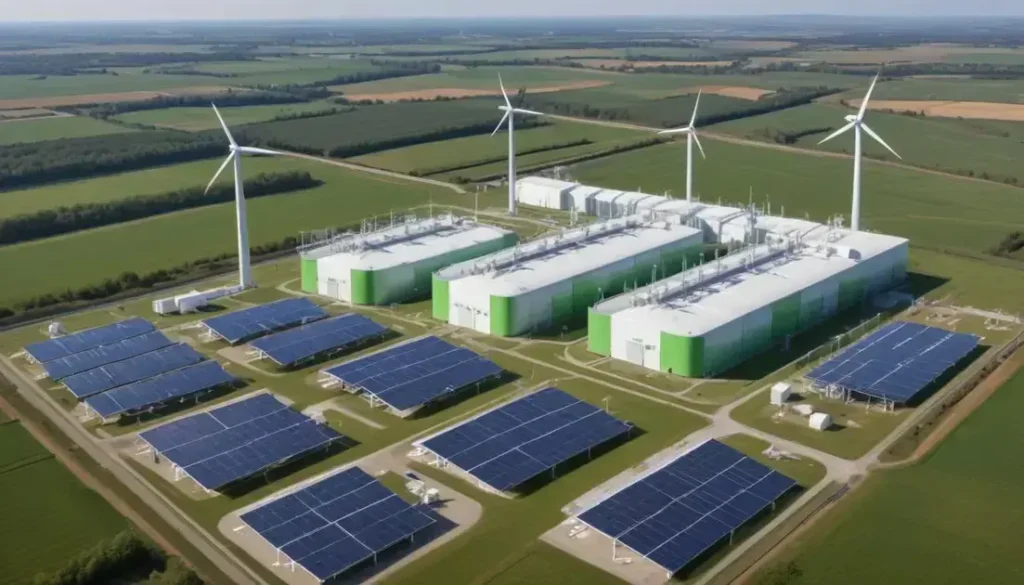Recycling technology in India is rapidly evolving, driven by advancements like AI and automated sorting systems, which improve efficiency and promote sustainability in waste management.
Recycling is becoming increasingly important as companies worldwide strive for sustainability. Have you ever wondered how new regulations could impact businesses, especially Indian exporters?
Tetra Pak’s investment in AI-powered recycling
Tetra Pak’s recent investment in AI-powered recycling represents a significant step towards enhancing the efficiency of waste management. By leveraging cutting-edge technology, Tetra Pak aims to streamline recycling processes, making them more effective and accessible. This innovative approach enables faster sorting and separation of recyclable materials, which is crucial in reducing environmental impact.
Through the integration of AI systems, Tetra Pak significantly improves the quality of recyclable materials collected. The use of machine learning algorithms allows for better identification of materials, ensuring fewer contaminants in the recycling stream. This development not only benefits the company but also supports a circular economy, ultimately contributing to sustainability goals.
Collaboration with Local Waste Management: To maximize the impact of their investment, Tetra Pak is collaborating with local waste management organizations. These partnerships are essential for implementing AI technology effectively on the ground. By working together, they can address specific local challenges and enhance overall recycling rates.
Moreover, Tetra Pak is also focused on educating consumers about proper recycling practices. By raising awareness, the company aims to boost public participation, making recycling a community effort. This proactive strategy shows Tetra Pak’s commitment to sustainability and its role in fostering a greener future.
The role of Recycleye’s technology in waste management
Recycleye is revolutionizing waste management through its innovative computer vision technology. This cutting-edge solution allows for the precise identification and sorting of various materials in recycling streams. By utilizing AI-driven algorithms, Recycleye enhances the efficiency and accuracy of recycling facilities, significantly reducing contamination rates.
The implementation of Recycleye’s technology addresses one of the most significant challenges in waste management: material identification. Traditional sorting methods are labor-intensive and prone to errors. In contrast, Recycleye’s automated systems can analyze and sort waste materials faster and more accurately, paving the way for increased recycling rates.
Collaboration with Local Facilities: Recycleye actively collaborates with local waste management entities to refine its technology further. These partnerships ensure that the solutions provided are tailored to specific operational needs, enhancing overall productivity. The ability to adapt the technology to different waste streams makes it a versatile tool in the industry.
In addition to improving operational efficiency, Recycleye emphasizes the importance of data analytics. By collecting and analyzing sorting data, the company provides insights that help organizations optimize their waste management strategies. This data-driven approach is vital for fostering a sustainable circular economy.
Impact on UK and Indian environmental policies
The relationship between UK and Indian environmental policies is becoming increasingly crucial as both nations strive for sustainability. Recent developments in international environmental regulations directly influence how each country approaches sustainable practices. The UK’s stringent environmental policies set a benchmark, encouraging Indian firms to adopt similar measures.
In particular, India is reassessing its waste management strategies in light of UK regulations. These adaptations include enhanced recycling processes and stricter guidelines for waste disposal, aimed at reducing pollution and promoting circular economy principles. By aligning with international standards, Indian companies can enhance their competitiveness in global markets, especially in exports.
Collaboration Opportunities: The intersection of UK and Indian policies also opens doors for collaboration. Joint ventures in green technology can lead to shared knowledge and innovative solutions for pressing environmental challenges. By partnering, both countries can create a more sustainable future that benefits their economies and the planet.
Moreover, the impact of these policies is not just limited to businesses; they also influence public awareness and consumer behaviour. As communities become more informed about environmental issues, there is a growing demand for eco-friendly products and practices. This shift leads to more significant support for sustainable initiatives from both governments and businesses.
Future of recycling technology in India
The future of recycling technology in India looks promising, driven by innovative solutions and a growing emphasis on sustainability. As the nation grapples with increasing waste generation, the adoption of advanced recycling technologies becomes imperative. Innovations such as automated sorting systems and AI-driven analytics are transforming the landscape, making recycling more efficient and effective.
One significant advancement is the integration of IoT devices in recycling plants. These devices provide real-time data on waste management processes, helping facilities optimize operations. By tracking material flows and identifying bottlenecks, companies can reduce downtime and improve overall productivity.
Public-Private Partnerships are playing a vital role in supporting this technological evolution. Collaborations between government bodies and private firms encourage investment in recycling infrastructure and technology. This synergy is essential for developing robust recycling ecosystems that can handle the growing volumes of plastic and electronic waste.
Moreover, as awareness about environmental sustainability increases, consumers are becoming more proactive about recycling. This shift in public perception is pushing companies to adopt greener practices and invest in technologies that support a circular economy. The collaboration between technology and a motivated community will pave the way for a sustainable future in recycling, driving India towards achieving its environmental goals.
Challenges faced by recycling companies
Recycling companies in India face numerous challenges that hinder their ability to operate efficiently. One primary issue is the lack of infrastructure. Many facilities lack modern technology for sorting and processing recyclable materials, leading to lower recycling rates and increased contamination.
Another significant challenge is the fluctuating quality of recyclables. With varying levels of public awareness and participation in recycling programs, the type and quality of materials collected can differ significantly. This inconsistency complicates processing and may deter companies from investing in advanced technologies.
Government regulations and compliance can also pose hurdles. While new policies aim to improve recycling rates, the complexity of adherence can overwhelm smaller players in the industry. Many recycling companies lack the resources necessary to navigate regulatory frameworks effectively, which can lead to non-compliance and financial penalties.
Furthermore, securing funding and investment can be a daunting task. Many recycling companies are small and struggle to demonstrate their viability to potential investors. This financial strain limits their ability to upgrade equipment, introduce new technologies, and expand their operations.
Finally, public perception and engagement are crucial. Many consumers remain unaware of proper recycling practices, which affects the overall efficiency of recycling programs. Educating the public and fostering a culture of recycling is essential to overcome these challenges and enhance the industry’s effectiveness.
Collaborative efforts in the sustainability sector
Collaborative efforts in the sustainability sector are proving essential for tackling pressing environmental challenges. By joining forces, organizations can pool resources, share knowledge, and amplify their impact on sustainability initiatives. Partnerships between governments, NGOs, and businesses are particularly effective in driving systemic changes.
One prominent example is the public-private partnerships aimed at promoting renewable energy. By collaborating, these entities can invest in infrastructure that supports clean energy production, such as solar and wind farms. This shared commitment not only accelerates progress but also helps in meeting regulatory targets.
Additionally, collaboration in the waste management sector is becoming increasingly important. Companies have begun to work together to create circular economy solutions that reduce waste and promote recycling. Through joint initiatives, they can develop innovative technologies for converting waste into valuable resources, effectively minimizing environmental impact.
The role of community engagement cannot be overstated. By involving local populations in sustainability projects, organizations can foster a sense of ownership and responsibility. Educational programs that raise awareness about environmental issues encourage community members to participate actively in initiatives.
Such collaborative approaches not only optimize the effectiveness of sustainability efforts but also create a more resilient framework for addressing the challenges posed by climate change. Together, stakeholders in the sustainability sector can build a sustainable future for generations to come.
In conclusion, embracing sustainability is vital for our future
As we face environmental challenges, collaborative efforts in the sustainability sector play a key role in creating effective solutions. By partnering with various organizations, businesses can tackle issues like waste management and renewable energy more efficiently.
Engaging communities also enhances these initiatives, fostering a sense of responsibility and ownership among individuals. Together, these combined efforts pave the way for a greener and more sustainable future.
Every small action counts, and by working together, we can make a significant impact on our planet. It is time to prioritise sustainability and take the necessary steps to ensure a healthier environment for future generations.
Common Questions About Sustainability and Recycling
What is the importance of recycling for the environment?
Recycling reduces waste in landfills, conserves natural resources, and decreases pollution, making it essential for protecting our environment.
How can businesses collaborate for better sustainability practices?
Businesses can collaborate by forming partnerships, sharing resources, and implementing joint sustainability initiatives that benefit both parties.
What role do communities play in sustainability efforts?
Communities are vital as they help in awareness, participation, and support for local sustainability projects, creating a responsible and proactive attitude towards the environment.
What challenges do recycling companies face?
Recycling companies often encounter issues like inadequate infrastructure, fluctuating recyclable quality, regulatory complexities, and funding difficulties.
How can technology improve recycling processes?
Technological advancements like AI and automated sorting systems can enhance the efficiency and effectiveness of recycling by improving material identification and processing.
What steps can individuals take to support sustainability?
Individuals can support sustainability by recycling properly, reducing waste, conserving energy, and participating in local environmental initiatives.


